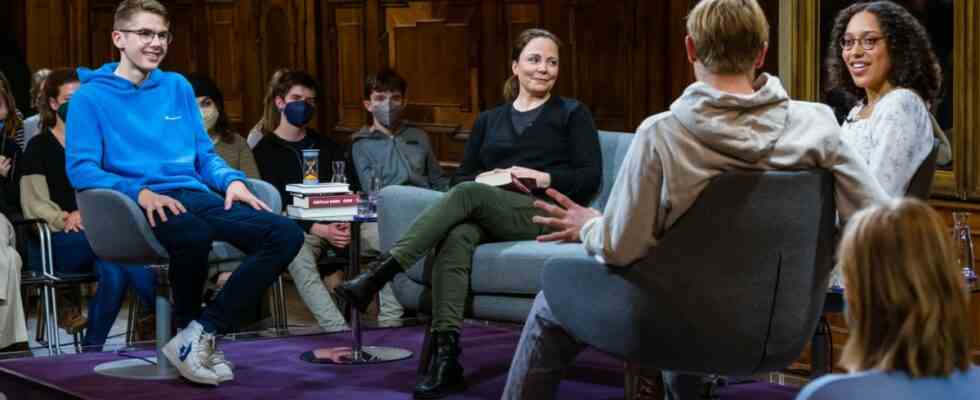Three teenagers in sneakers and hoodies discuss books, engage in heated arguments about contemporary literature and international classics. Stimulated, excellently prepared, turned to each other, easy-going. The presenter rarely speaks.
This is no romantic utopia for today’s UNESCO World Book Day. It is the faithful summary of what happened on ZDF on Saturday morning when a special program by the Literary Quartet was broadcast. It was not to be expected that the three young people whom Thea Dorn invited to the first “U21” edition of the literary quartet would do almost everything just as well as the usual guests, i.e. authors, intellectuals, those who are aware of their mission and impact .
17-year-old Lucas Stiller, 16-year-old Conrad Henzler, and 21-year-old Sara Akinsola each brought a book to discuss, including Benedict Wells’ coming-of-age story “Hard Land” (Diogenes), Kacen Callender’s “Felix Ever After” (LYX), a novel about a trans man in search of love, and Sibylle Berg’s not-so-teenish book “GRM” (Kiepenheuer & Witsch), a, in the words of Lucas Stiller, 620 pages long “rant” on capitalism.
Finally, the book that Thea Dorn had brought with her, the classic “The Stranger” by Albert Camus, was rigorously rejected by the teenagers. The fact that the main character Meursault, today one of the literary icons of philosophical existentialism, is fundamentally indifferent to the world, was considered by the teenagers to be outdated and anything but revolutionary. One would have liked to know where the revolution of the three would lead today.
Conrad Henzler said at the beginning that good books open up new “concepts” to the world, which student Sara Akinsola took as an opportunity to describe Kacen Callender’s unfortunate main character, the trans person Felix Love, as a gateway to a world of experience unknown to “Cis” people : Because you can find out in this book how people are doing who are not in harmony with their biological gender. The fact that Kacen Callender praises the beauty of trans people in a preceding sentence is too moral for Conrad Henzler.
The U21 serve is the most mentally agile edition in a long time
Thea Dorn argues in every program anyway about the tiresome topic of how morally good literature is allowed to be. It’s an old fault line between activists and those who believe literature must operate in an extramoral framework. What was remarkable was that the teenagers took up this old gossip so casually, but undogmatically let it flow into a seriously enthusiastic conversation about the book. In the end, even Thea Dorn, who is skeptical about political literature, has to thank her for this book.
It’s really curious, the Literary Quartet’s U21 serve is the most mentally agile edition in a long time. Even if the best-known German-language book program on TV still regularly tunes in around half a million viewers, the book talk seems a bit dormant, worn, untimely unironical, especially since Thea Dorn, to the extent that she has banned professional critics from the program, for holy-serious brawlers are interested as guests, who too often appear as if they are defending the world and not the book. Admittedly, there is a connection in between. But a more complex one than is sometimes suggested in the Literary Quartet.
With her honest interest and an age-appropriate, slightly skeptical respect for youth issues, youth language, youthful judgments, Tea Dorn was in full swing this time. More from the children’s quartet, please!

